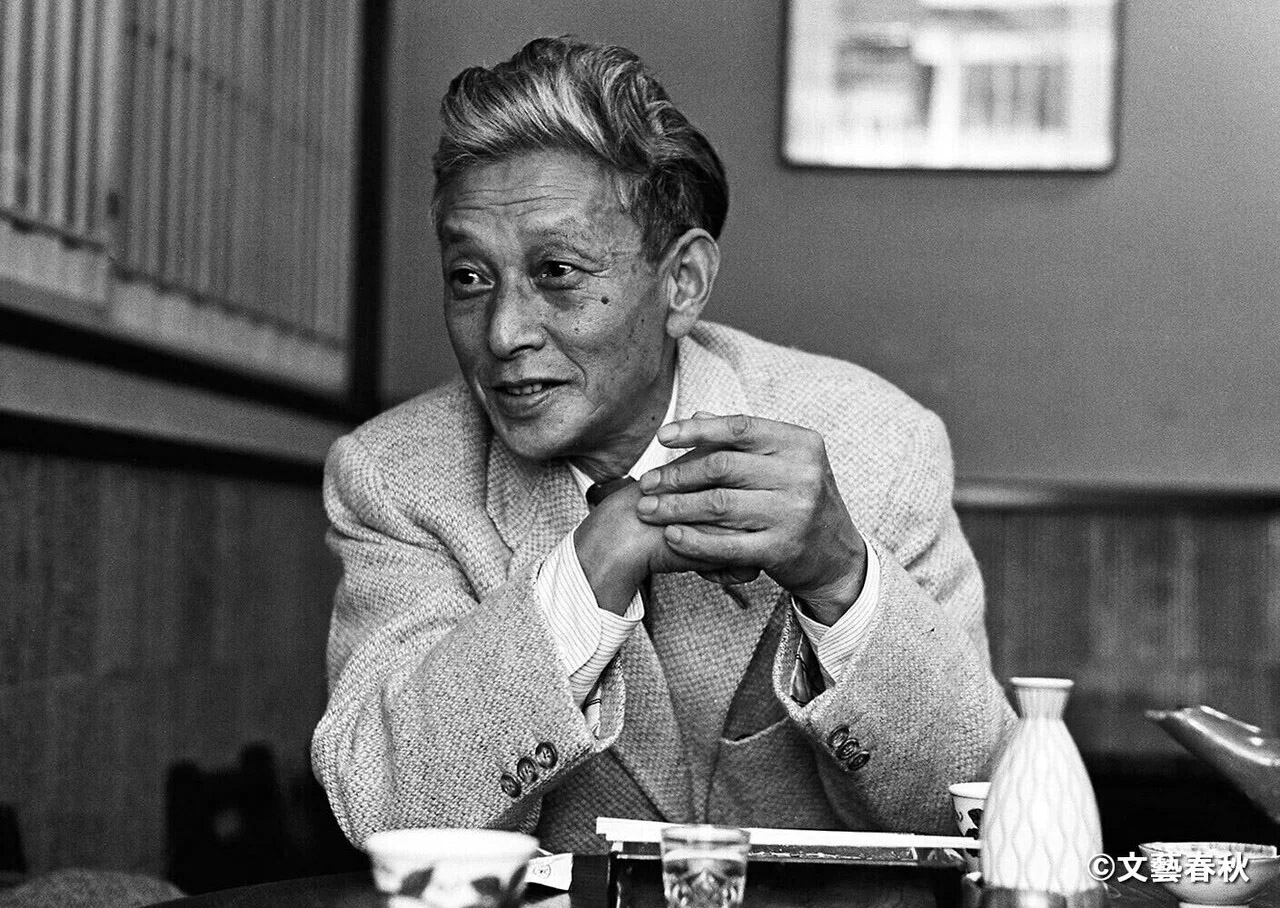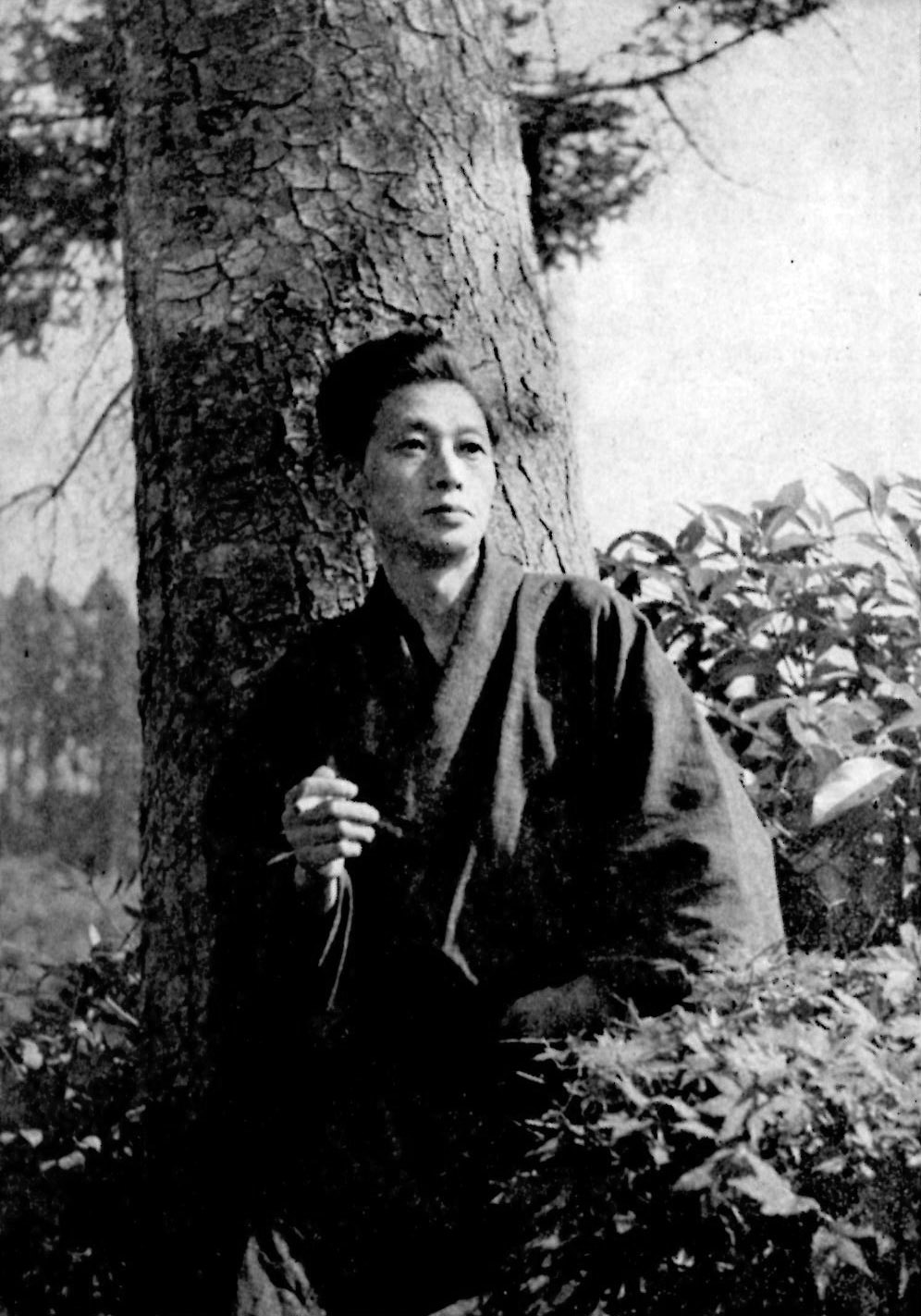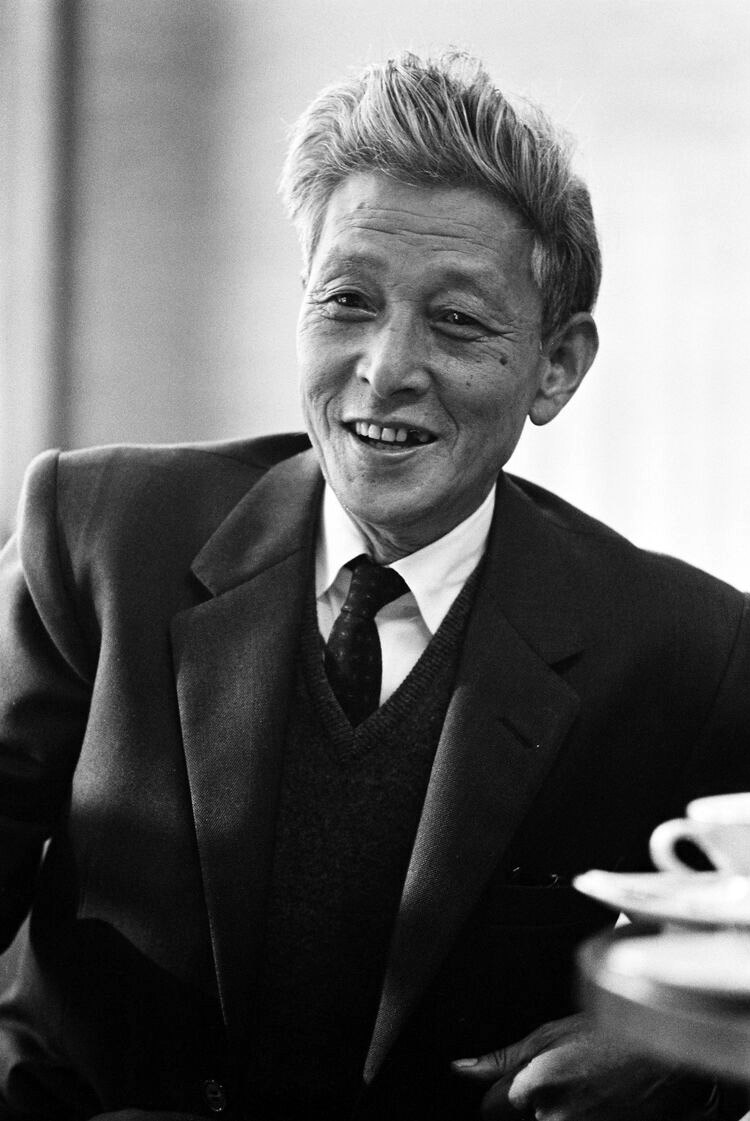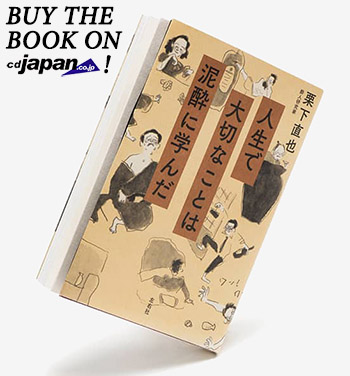Kobayashi Hideo
If you fall from a train station platform
Critic | 11 April 1902 – 1 March 1983
A suit and a cast. The silliest-looking getup there ever was.
Surely no one would disagree with the notion that in the Japanese corporate world, suits are this “thing” you’re just supposed to wear by default; a survival tool in a demerit system. So when you combine a suit with an orthopedic cast—something that just screams, “I messed up in my private life“—it makes for an outfit that comes across as very, very strange.
There’s this one esteemed person I know through work. He used to be a competitive skier in his student days, but he later stopped going to the slopes entirely, his reasoning being that were he to break his leg and get hospitalized or something of the sort, it would be a hindrance to his work. Subconsciously, we all have the impression that a suit with a cast is just the lamest-looking thing there is.
Of course, you never know how or when disaster might strike. One day you may be forced to wear a cast through no fault of your own. Although even then there’s no denying that it just looks stupid.
But the truly tragic thing is when you have to wear a cast all because of a mistake you made on your own.
One time, I was at a drinking party where I was joined by a Mr. “M,” a gentleman who worked at a financial institution known for their highly competitive corporate culture. He walked in as the very picture of “suit and cast.”
Looking exactly like someone who just wanted to crawl into a hole somewhere, he was quiet, wriggling his large body around as he tried to hide his left arm which was wrapped in a cast. Finally, after he’d managed to get some drinks in him, he started grumbling. “It’s my own fault for having had too much to drink. It’s my own fault that I drunkenly fell off a train platform. I’m lucky to even be alive.”
While this was a time before they’d introduced those protective platform doors, the simple fact is that this man had gotten so drunk that he’d fallen and broken his arm. I knew I shouldn’t laugh, but the words coming out of that serious-looking face of his were like something out of a comedy routine. It was almost poetic. Aida “Poet of Zen” Mitsuo himself would’ve been amazed.
Even just the fact that he’d still decided to come out for drinks in the first place… As I was trying to cheer him on—joking how he was going to end up breaking his right arm, too—I thought to myself, “This guy’s like Kobayashi Hideo!”
Kobayashi Hideo, referred to as the “God of Modern Criticism.” Known for his difficult-to-understand writing, everyone reading this who is around their forties and beyond has probably come across his work in their entrance exams and the subject of Modern Japanese. He is one of those authors whose works used to frequently appear in exam questions.
It is even said that after an entrance examinations reform that introduced the Common First-Stage Exam, the very first thing nominated for exclusion in an attempt to eliminate bad or tricky questions were Kobayashi’s works. That’s how difficult his writings are at first glance.
There is “a beautiful flower.” There is no such thing as “the beauty of the flower.”
If you were to show the above to a high schooler, I bet they’d just stare at it with their mouth agape.
And speaking of Kobayashi, he was not a good drunk. In fact, his editors back then described him as a vicious one.
Soon after the end of the war, Kobayashi had been in Kanda drinking at a pub called Selene. Having been given a big, half-drunk bottle of sake, he was at Suidobashi Station on the Chuo Line. Platform walls at the time were crude, consisting of mere logs fastened to steel frames, and Kobayashi—with his bottle in hand—fell around ten meters down through a gap in one of those walls.
The book Kansou has the details.
I was quite drunk. This was a time when alcohol was still precious, and so I was traipsing around with a half-drunk one-sho bottle in hand.
That much I remember. The rest, I have no idea.
That doesn’t sound very good at all. But although he lost his memory in the fall, he somehow came out unharmed otherwise.
I had apparently hit my chest and I was in terrible pain. But I endured it, got myself up halfway, and as I carefully examined my body under the light from outside, I couldn’t find a scratch anywhere. I’d been holding my bottle as I fell, but it had seemingly been blown to smithereens as it came in contact with a chunk of concrete, now covering me in tiny little fragments.
As I was sitting there on those black coal cinders, observing the shards of glass as they glistened in the light, it became clear to me that it was my mother who had saved my life.
His mother. It was his late mother who’d been his savior.
Sorry, what?
One might think that this is just Kobayashi Hideo being his usual self. But I would feel bad for the man if I didn’t tell you the full context in which he gave this account.
Kansou was his work discussing French philosopher Henri Bergson. But even to someone like Kobayashi—who was himself known for his difficult-to-understand commentary—the subject matter was apparently just too difficult, and the serialization had to be suspended.
He talks about this drunken incident in the first issue of the serialization. Before he starts describing how loaded he’d gotten that night, however, he opens the article with: “Two years after the end of the war, my mother died.” He spends a long time spelling out how the death of his mother had actually had much more of an impact on him than the war.
Let me be clear: while I may be using strange words to say it, I’m genuinely trying to convey the plain truth.
I don’t “think” that my mother saved me that time, nor is it that I “feel” like she did. It simply became clear to me that that’s what had happened.
I don’t know. Even in keeping with that premise and assuming he’s just being candid, I still don’t understand it in the least. I despair of my own stupidity.
But then we’re here to talk about Kobayashi Hideo’s drunken antics and not his mother, so let’s move on.
The first words I heard were spoken by the station staff. “He’s alive! He’s alive!”
I later learned that the previous week someone had fallen from the opposite platform, and they had died instantly. I told the station staff, “I’m okay. I’m not hurt anywhere. You don’t have to call the doctor or notify anyone. Just let me sleep at the station tonight.” I drank the water I was given, and slept soundly until morning.
The next day when someone from this company came to pick me up, one of the station staff was apparently telling them how “strong-willed” I was.
But I am not a strong-willed man. Not in the least. It’s just that, in that moment, I felt truly invigorated in spirit.
Flat out refusing all good will from the station staff and just sleeping like a log… What a pain in the neck, this guy. It’s a far cry from the attitude of Kawakami Tetsuro, Kobayashi’s sworn friend who wanted to offer whisky to the police officers who’d thrown him in the drunk tank for a night.
Still, apparently even Kobayashi tried in his own way to reflect on his actions a little bit.
I tried to reflect, but doing so only made it clear to me how self-reflection doesn’t help one get any closer to the real core of the experience.
Sure, he could talk about Bergsonian philosophy all day long. But self-reflection? Apparently that was just too much of a hassle for this guy. You just want to snap at him, “Can’t you even say you’re sorry?!”
This “Platform Fall Incident” apparently created quite a stir in the literary world at the time. In Kyosou no Bungaku Kobayashi Hideo-ron, author Sakaguchi Ango could not hide his astonishment.
He writes: “I had convinced myself to think that Kobayashi was a spirited individual; a real tough customer; a man of meticulous character and knowledge; the one person you would never see being hit by a car or falling into a river or some such.”
But he then adds that because Kobayashi’s writing was so abstruse, “I had surely been deceived by his writing, misinforming my conception of him.”
Rereading his old critiques of people like Shiga Naoya, a lot of it is now thought as fairly half-baked. However, it’s important to note that at the time he was but playing his part. It’s not that the man himself was immature, but rather that we—the Japanese people—were. Japan learned Kobayashi’s methods and matured alongside him.
While these days we tend to pick apart at his shortcomings, we must not forget that the fact that we now even recognize those shortcomings is only because we had first learned his methods. This in itself was Kobayashi’s greatest contribution to literature.
While he speaks of him with respect, what he’s really saying there is: “I didn’t realize it before, but when I heard how he got drunk and fell, and then I went back and reread his stuff… It’s all sloppy work!”
When you think about it, there was really no correlation between the abstruseness of his writing and his demeanor in his private life. It’s all just the reader imagining things.
In fact, Kobayashi falling from the station platform was not one of those “even monkeys sometimes fall from trees” type of deals—it was just one in a series of his nightly escapades.
One night, after drinking themselves silly in Tokyo, Kobayashi and a cousin of his returned to Kamakura where the former lived. Deciding that they still hadn’t had enough to drink, they entered a back alley waiting room. “Bring us booze!,” they demanded. A middle-aged woman, with a perplexed look on her face, brought them a decanter.
But the taste was not to Kobayashi’s liking, and he felt that even the service was bad, so he suggested to his cousin that they leave. This, however, caused the woman to become exasperated.
It’s no wonder she was enraged—the two had entered a private residence.
In other words, they had literally walked into a stranger’s house and shouted at them to bring them alcohol. It was practically break-in robbery. The woman figured it’d be no use trying to defy these two drunks who had broken into her home, and so she just quietly served them alcohol, hoping that would prevent any incident. But really, she would’ve been well within her rights to start screaming and call the police. The two would’ve had no excuse.
The next day, Kobayashi and his cousin wanted to go and apologize. They were unable to do so, however. They had been so utterly black-out drunk that they had no recollection of where they had been.
Here’s another story. One time, Kobayashi was on the train and there was a famous actor sitting in front of him. Kobayashi—in his hooched-up state—was absentmindedly thinking to himself how this actor looked like a chimpanzee. Being the grown-up that he was though, he didn’t say anything.
But then as the train arrived at his station, he suddenly just couldn’t resist anymore. Kobayashi told him, “You look like a chimpanzee.”
The actor proceeded to knock his ass to the ground.
While Kobayashi used to come across as someone quite distant to me, maybe he’s really not all that dissimilar to us normal people after all. Falling down with a big bottle of booze in hand, marching into a stranger’s house and demanding to be served alcohol, calling people chimpanzees… To possess this sort of range is something everyone should strive for.
Sure, when you show other people an unexpected side of yourself, you might get the occasional naysayer who’s going to think, “This guy’s an idiot.” But by the same token, it will also make people feel closer to you, and you will surely become more likable in your workplace.
By the way, as for that acquaintance of mine, Mr. “M,” in the next staff rotation after his fall he was then transferred out to the middle of nowhere in the countryside. Whether or not this had anything to do with him drunkenly falling down off a train station platform and breaking his arm, I do not know.




